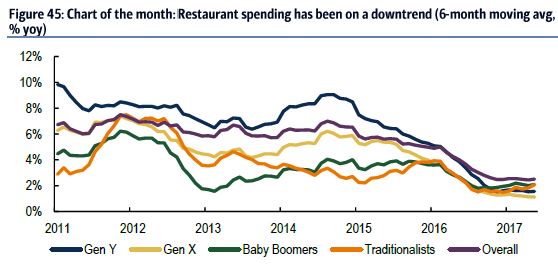Restaurant sales growth has been slowing at a puzzling pace usually seen in a much weaker or even recessionary economy.
Bank of America Merrill Lynch economists say millennials are to blame.
Ahead of Wednesday’s government retail sales report, the economists studied restaurant sales, which have seen a steady decline in their growth rate for the past three years. The economists expect activity picked up in October after weakness due to Hurricane Irma, but the overall trend remains slower and growth remains depressed year over year.
“It stands out as a bit unusual how soft restaurant spending has been considering where we are in the business cycle,” said Michelle Meyer, head of U.S. economics at BofA Merrill Lynch. “The consumer should be spending more on a broad range of items. But we’ve seen restaurants slowing more akin to a recessionary environment.”
Restaurant sales are a component of monthly retail sales data. The BofA economists expect retail sales, based on aggregated Bank of America credit card and debit card data, grew 0.2 percent in October excluding autos, or 0.4 percent when excluding autos and gasoline. Restaurant spending has been on a decelerating trend but it’s still positive.
Restaurant spending shifted in all demographics, but none so much as millennials, also known as Gen Y on the following chart. The growth pace of spending went from 9 percent year over year in 2015 to just 1.6 percent now.

Source: Bank of America internal data
The economists compared spending at big chain restaurants to smaller local restaurants and found relative weakness in the bigger chains, where spending outright declined. For local restaurants there was a slight acceleration in trend, she said. But since January, there’s been a year-over-year contraction at large restaurants.
The reason for the slowdown by millennials could be a change in lifestyle as they get older and spend money on other things, like housing and home cooked meals, Meyer said. But that’s not necessarily showing up in supermarket trends.
“Grocery spending has also been pretty slow,” she said. However, another possible disruption could be online grocery shopping, which may not be fully captured in the data.
Consumers also appear to be spending more per restaurant visit but going out less. The transactions per household declined since late 2014, but the cost per transaction increased slightly.
“It’s unusual to have this type of restaurant slowdown without having the economy slow down broadly,” Meyer said. She is watching the holiday season in November and December as consumers spend for the holiday and go out to shopping centers. “I think it will be telling to observe what they spend on,” she said.
According to Thomson Reuters, retail sales are expected to be flat. Excluding autos, sales are expected to be up 0.2 percent, after a 1 percent gain in September.
Meyers expects spending to be up in discretionary areas, like furniture and restaurants, weak in September and August due to Hurricanes Irma and Harvey. Building materials and gasoline, boosted by the hurricanes, should be softer.
